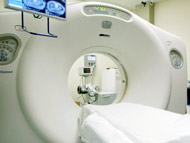I’ve previously blogged about the dangers of excessive radiation involved with medical imaging procedures, such as CT scans and x-rays, and the FDA’s new program to reduce patients’ unnecessary exposure to radiation.
Last week, as part of that FDA program, Dr. Julian Nicholas, a former FDA scientist, testified that he was forced out by his FDA bosses when he refused to approve General Electric’s “virtual colonoscopy” procedure, a product that would use CT scans to test for colon cancer. Dr. Nelson refused to endorse GE’s virtual colonoscopy because between 1.5 and 2 percent of all cancers are caused by radiation from CT scanning and Dr. Nicholas did not believe that the level of  radiation exposure involved in CT colonoscopies was justified by increased detection or the less invasive nature of the procedure (compared to traditional colonoscopies). A patient receiving a single CT scan gets as much radiation from the CT scan as he would from 400 chest x-rays.
radiation exposure involved in CT colonoscopies was justified by increased detection or the less invasive nature of the procedure (compared to traditional colonoscopies). A patient receiving a single CT scan gets as much radiation from the CT scan as he would from 400 chest x-rays.
CT scans, nuclear medicine and fluoroscopy are only one-fourth of all medical imaging procedures in the US (x-rays are far more common), but these procedures expose patients to nearly 90 percent of the radiation they get from medical imaging. They are also, generally, more lucrative for hospitals than x-rays.
Boston Personal Injury Lawyer Blog
The Law Office of Alan H. Crede
